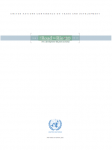Essays in this second volume of UNCTAD's "The Road to Rio+20" series discuss pathways towards development-led greening of the economy under four themes: government as an enabler of the green economy; business as innovator; green transitions around the world; and historical and social perspectives.
 November 2011: The UN Conference on Trade and Development (UNCTAD) has released the second volume of “Roads to Rio+20,” a collection of essays on the green economy, focusing on potential pathways for governments to enable a green economy in accordance with their respective development priorities.
November 2011: The UN Conference on Trade and Development (UNCTAD) has released the second volume of “Roads to Rio+20,” a collection of essays on the green economy, focusing on potential pathways for governments to enable a green economy in accordance with their respective development priorities.
The essays, grouped into four sections, provide real-world references for governments, business and civil society, illustrating questions on the validity of the green economy concept as a motor for development. Essays in the section on government as “enabler” of the green economy discuss the support policies and investment levels needed, as well as impediments such as lack political will. The section on business as the “innovator” of the green economy discusses: prospects for green profits; clean and sustainable technology and innovation; and greening the economy through fair trade, open markets and skills transfer.
The section on green transitions around the world contains essays describing the European experience, as well as case studies on financing for organic waste composting in Bangladesh and green energy for development in Nepal. The final section provides historical and social perspectives, with one essay tracing the continuity of policy discussions and controversies since the UN Conference on the Human Environment in Stockholm (1972); and another essay discussing social policy, participation and the transition to a green economy. [Publication: The Road to Rio+20: For a Development-led Green Economy]